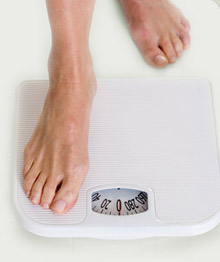
Tips for avoiding menopausal weight gain
Posted in Health & Wellness on October 5, 2012. Last modified on April 15, 2020. Read disclaimer.
Many women experience weight gain as they near and enter menopause -- and then find it difficult to lose the extra pounds. On average, American women gain about one pound a year between their mid-40s and their mid-50s, leading many to blame menopause. Though you may be tempted to accept it as part of menopause, that's not necessarily the case.
We shouldn't be so quick to point the finger: experts suspect a number of culprits in mid-life weight gain in women:
Hormones - During menopause, hormonal shifts can affect bone density and body fat distribution: fat that once went to the hips and thighs can migrate to the abdomen, resulting in the so-called "menopot."
Reduced muscle mass - As women age, their lean muscle mass gradually declines, and fat starts to make up a higher percentage of body weight. Lean muscle burns more calories than fat, so loss of muscle mass means your resting metabolism slows down.
Decreased exercise - When people grow older, their activity level tends to decline. About 60% of adults aren't active enough, and this just increases with age. Physical activity level is the one factor most related to weight gain.
How to keep the weight off
So, with all these factors at work, is it possible to maintain a healthy weight throughout menopause? Though it will take commitment and dedication, the answer is yes. The Healthy Women's Lifestyle Project, which followed women through menopause, found that those who both ate a low-calorie diet and got regular exercise lost weight, while those who didn't gained an average five pounds after one year. But it is best to not wait until menopause before making healthy lifestyle changes.
Here are a four steps, recommended for all women as they approach the menopausal transition:
- Eat a balanced diet
As we age, most of us will need the same amount of nutrients but fewer calories. Especially important for women over age 50 are foods that provide sufficient vitamins B6 and B12, calcium and vitamin D - Stay physically active: While any amount of activity is better than no activity, adults (health permitting) should strive for:
- Participate in aerobic activity at least 5 days a week at a moderate level for at least 30 minutes, a vigorous level for 15 minutes or a combination of the two. This can include walking, bicycling, dancing, swimming or even working around the house and helps support respiratory, cardiovascular and overall health
- Add muscle building exercises to your workouts, 2 days a week. Examples include lifting weights (even if it is something as simple as soup cans or water bottles), doing modified push-ups, sit-ups, etc.
- Work at improving or maintaining your balance to reduce your risk of falls. A few simple balance-building exercises that require no special equipment are standing heel raises, standing knee flex, knee lifts, hip flexes, and balancing on one foot.
- Don't smoke
Also, avoid inhaling secondhand smoke. - Stay current on your gynecological and general health screenings
This includes pelvic exams and mammograms, blood pressure and bone density tests, etc.
 Test your smarts about aging?
Test your smarts about aging? Take our heart smart mini quiz
Take our heart smart mini quiz Heart health and Vitamin C
Heart health and Vitamin C How to prevent computer strain
How to prevent computer strain Are eggs heart-healthy or harmful?
Are eggs heart-healthy or harmful? Tips for avoiding constipation
Tips for avoiding constipation Ways to support our troops
Ways to support our troops What's YOUR risk of heart disease?
What's YOUR risk of heart disease? 4 Important heart health tests
4 Important heart health tests Healing properties of chamomile tea
Healing properties of chamomile tea Prevent menopausal weight gain
Prevent menopausal weight gain Health dangers of sedentary lifestyle
Health dangers of sedentary lifestyle
